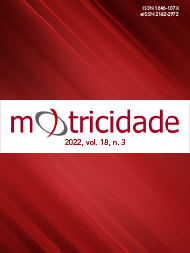Factors associated with perceived quality in Turkish fitness centres: a qualitative perspective
DOI:
https://doi.org/10.6063/motricidade.26620Palavras-chave:
Fitness centres, staff quality, program quality, instructor quality, qualitative methodResumo
This study aimed to define the general factors affecting the quality of fitness centres from the point of view of the members’ opinions and the relation densities of the features within these factors. The study was carried out using the qualitative method. Data coding was done utilising MAXQDA, a qualitative data analysis program. MAXQDA’s code co-occurrence model feature is employed to visualise code relationships. According to the research findings, the most intense relationship that the factors affecting the staff quality perception of fitness centres have with each other was defined as “Willing to help-Friendliness”. When looking at the results obtained in other factors, codes of “Expertise-Communication” for the quality of the trainer, “Facility Atmosphere-Air conditioning” for the quality of the physical environment, and “Meeting the need-Program variety” for the program quality were associated with each other. Findings from this study provide implications for facility managers who need to closely monitor fitness centres’ physical environment, staff, instructors, program quality and implement remedial measures as needed.
Downloads
Publicado
Edição
Secção
Licença
Os autores dos manuscritos submetidos para publicação deverão ceder, a título integral e permanente, os direitos de autor (copyright) à revista Motricidade e às Edições Sílabas Didáticas. A cedência de direitos de autor permite a publicação e divulgação do artigo em formato impresso ou eletrónico e entrará em vigor a partir da data de aceitação do manuscrito. Os autores concedem, ainda, os direitos para a revista Motricidade utilizar e explorar o respetivo artigo, nomeadamente para licenciar, ceder ou vender o seu conteúdo a bases de resumos/indexação ou outras entidades.
Nos termos da licença “Creative Commons”, os autores poderão reproduzir um número razoável de exemplares para uso pessoal ou profissional, mas sem fins comerciais. Nos termos da licença SHERPA/RoMEO, os autores poderão, ainda, disponibilizar/arquivar uma cópia digital final (versão postprint) do artigo no seu website ou no repositório científico da sua instituição.


